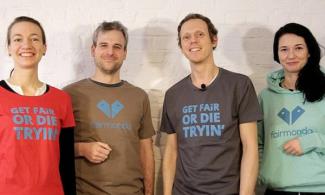
Q&A with Co-Founder Felix Weth
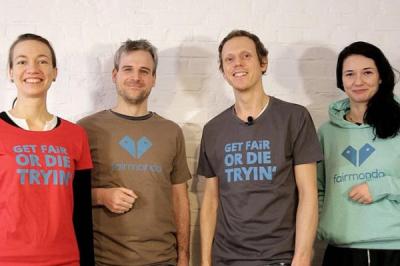 cross-posted from Shareable
cross-posted from Shareable
Felix Weth has taken on a big challenge: create a platform cooperative to compete with the likes of eBay and help create a new, fair economy. The result of his efforts is Fairmondo, a member-owned digital cooperative that enables people to sell ethical products. Launched 2013 in Germany, Fairmondo is now going global.
Fairmondo is rooted in an ethos of open source, open innovation, and a commons-based society. It has funded itself through a series of successful crowdfunding campaigns that have raised hundreds of thousands of Euros in member equity.
To scale up, Weth and the Fairmondo team plan to use a federated model where co-ops are started in countries around the world to be part of a global network of country-based co-ops feeding into the platform. In this way, they hope to leverage local expertise to enter new markets while spreading the wealth even further.
While Fairmondo has only just begun creating the federation, there’s a solid team in place to realize their vision of Co-op 2.0. As pioneers in the movement toward democratic platforms, which benefit the workers and the members above all, Fairmondo is paving the way for other entrepreneurs and changemakers.
I spoke with Weth about Fairmondo’s growth, the lessons learned so far, and what happens next.
Chelsea Rustrum: How did you originally fund Fairmondo and how are you sustaining it now? Did the crowdfunders automatically become members or was that a separate process? How does all of this work legally?
Felix Weth: We originally funded Fairmondo through crowdfunding, using a platform to distribute coop-shares. The crowdfunding platform thereby provided an escrow service—they collected the membership applications and once our campaign had successfully ended, they handed the applications to us. We thus applied the requirements of German cooperative law to the crowdfund. Since then, we regularly do a membership campaign. Today, our monthly costs are covered through income from fees and subscriptions by customers.
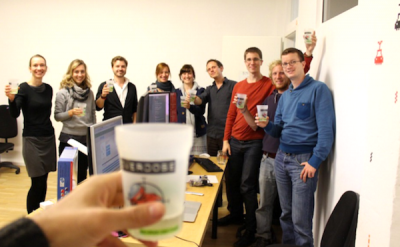 We used the German platform startnext.com. With them, we developed a solution of how we could crowdfund coop shares through their platform. Two examples are (both still under our former name Fairnopoly): startnext.com/fairnopoly and startnext.com/fairnopoly2
We used the German platform startnext.com. With them, we developed a solution of how we could crowdfund coop shares through their platform. Two examples are (both still under our former name Fairnopoly): startnext.com/fairnopoly and startnext.com/fairnopoly2
So far, we’ve done two campaigns for raising member shares. Another one is scheduled this spring.
What is your business structure in Germany and what would it be in the U.S. if you localized here as well?
Fairmondo is registered as a cooperative, according to German law. In order to preserve our vision even if the project grows big, we developed a set of principles and bylaws that we call "Cooperative 2.0". They consist of seven core elements, which any new Fairmondo chapter needs to adapt. Among those are mechanisms to ensure democratic ownership and accountability, as well as an uncompromising commitment to transparency. Internally, local coops are largely free to adapt their preferred modes of operation. In Germany we are adapting a holacracy type of process.
Here are the seven core elements of Cooperative 2.0:
- 9/10 people have to agree to change anything in the general principles
- Democratic accountability to all stakeholders
- Independence of individual vested interests
- Uncompromising transparency
- Distributed profits (see 4/4 profit distribution model below)
- The magic of the crowd
- Open source
What is your management model?
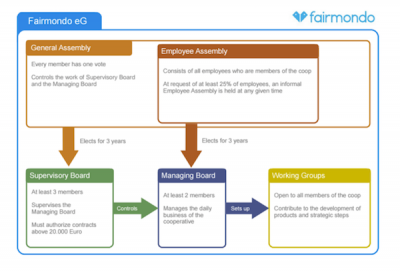 There is no specific management model attached to Fairmondo's coop 2.0 model. In accordance with German coop law, we have a managing board that is responsible (and liable) for running the company. Formally, this board takes decisions and is free to set up internal organizational processes.
There is no specific management model attached to Fairmondo's coop 2.0 model. In accordance with German coop law, we have a managing board that is responsible (and liable) for running the company. Formally, this board takes decisions and is free to set up internal organizational processes.
The one thing that is special in our model is that the managing board is elected by the employees. This enables employees to elect a new board if they do not support the management style implemented by the existing board, or if they feel they do not get sufficient voice in the design of these processes. Combined with the principle of uncompromising transparency, employees are thus empowered to make sure that the company is run in a way they are comfortable with.
The managing board knows it can be replaced by the employees, so it has a direct incentive to work for an open and respectful organizational culture and to listen to their needs, suggestions and critique. Which specific style or model suits the needs of the team best, is really left to the people in place.
In our coop back in Germany, we are in the process of introducing a holacracy variant, because it comes closest to what we have been practising so far. But this can change when people change, when organizational growth requires different solutions, or when we learn of new useful management models.
I know you have expenditures posted on an open bank account, but why not balances?
We consider Fairmondo still a startup and do sometimes face difficult budget limitations. In such situations, we first want to discuss solutions internally before we go into public discussion. Still, we do publish our annual budget report on our website, so if somebody really wanted to follow our balances, they could just calculate.
Can you accept capital from outside of the organization, from, say, investors? If so, in what increments and how much?
[A]lmost all our capital comes from members of the cooperative. We have a principle incorporated in our statute that prevents us from accepting bigger investments from any individual. Through this we aim to avoid the investor-driven dynamics you can find in many startups—most importantly, most investors pressure for an exit strategy.
How do you pay your employees? Do you feel they are adequately compensated or does that come once there is a surplus?
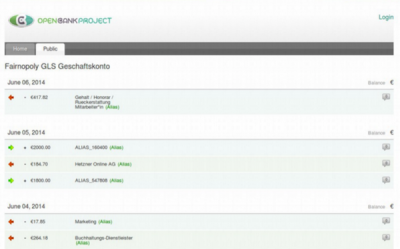 Right now we work on a very limited budget and this forces us to work with very moderate salaries. We did and do communicate this constraint on our job ads and interviews. At one moment we did have to reduce our team, which at the time was mainly paid through the starting capital we raised in our crowdfunding campaign. We then had to restructure into a setup that is covered by our monthly income.
Right now we work on a very limited budget and this forces us to work with very moderate salaries. We did and do communicate this constraint on our job ads and interviews. At one moment we did have to reduce our team, which at the time was mainly paid through the starting capital we raised in our crowdfunding campaign. We then had to restructure into a setup that is covered by our monthly income.
As we have monthly presentations of our budget situation with the team, everybody was aware of this. The restructuring was then a quite difficult process in which we brought employees' needs, business needs, and budget limitations into a balance that worked for us. Also, Fairmondo is supported by many volunteers (including the managing board), and some employees choose to work more time than they are paid for.
In order to compensate for this, our Cooperative 2.0 model uses a special "Fair Founding Point" system. For every unpaid hour contributed to Fairmondo, members receive an equal number of 200 points. These points are registered in the bylaws and entitle those members to an extra share of the surplus once the cooperative works successfully enough to actually make one.
Can you please explain your four-pronged approach for distributing surplus?
Fairmondo aims at very broad membership (We now have over 2,000 members, if successful it should have hundreds of thousands.). We therefore defined very clearly what should happen with any surplus in case our business grows big:
- One quarter is distributed to members through their shares
- One quarter is distributed through the Fair Founding Points just mentioned
- One quarter goes as donations to nonprofits that the users decide on
- The last quarter is used for developing the wider Fairmondo project
How does scaling work with Fairmondo? For example, you said there is interest from U.S. ambassadors to localize the platform in America, but what are the incentives for someone to manage this process and build a team here?
At the international level, we want to scale Fairmondo by transferring the model in the form of local cooperatives in each country, owned and controlled by local stakeholders. People who want to get involved with this normally share the vision of developing new types of online platforms, where ownership is democratic and business activities are directed towards the benefit of society.
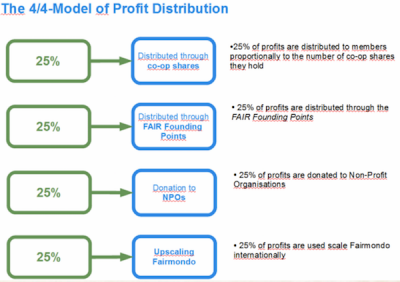 Our model essentially ensures that no individual ever can get rich through owning or working for Fairmondo. So motivation comes from the wish to contribute to a fairer, more sustainable, and more democratic economy.
Our model essentially ensures that no individual ever can get rich through owning or working for Fairmondo. So motivation comes from the wish to contribute to a fairer, more sustainable, and more democratic economy.
What have you learned from building Fairmondo that would help someone else who is just starting out save time, money, and resources to get started faster and more efficiently?
Above all, we did spend three years developing our open source marketplace software, that new cooperatives can use. We aim to increase our collective strength by collaborating on the further development of that software. We also spent quite some time on developing our coop model, which we are very happy to share. And, of course, we can share many learnings on crowdfunding, member and volunteer involvement, and the creation of networks in the segments you want to address.
What is the long term vision for Fairmondo?
The common vision of Fairmondo is to create a true alternative to the big online marketplaces and thereby provide a model for others who want to set up democratic and fair business at a larger scale. My personal long term vision is to create a multinational cooperative that is strong enough to outcompete the very big players currently dominating the market.
How will the federation of cooperatives work?
The global vision is to create a multinational cooperative. In every country covered, a local coop is created by a local team, owned by the local stakeholders. These local coops are members of and co-own the global framework cooperative, which owns the trademark, oversees adherence to the common standards, and supports new and weak local coops.
There will be an additional "Supervisory Assembly" of all individual members of the local coops, whose main role is making sure that the representative levels are not losing touch with the ground. I am especially looking forward to designing this one. It could possibly be based on flexible vote delegation using tools like Loomio.
If you are a more conscientious eBay, is that your competitive advantage or is it something else?
Our cooperative model is a crucial differentiator to the major competitors, which makes us attractive to a certain target group of people who want to see economic transition. In order to address a wider target group, we designed our marketplace in a way to make it as easy as possible to identify good products—that is, products with a better ecological and social footprint and products of high quality.
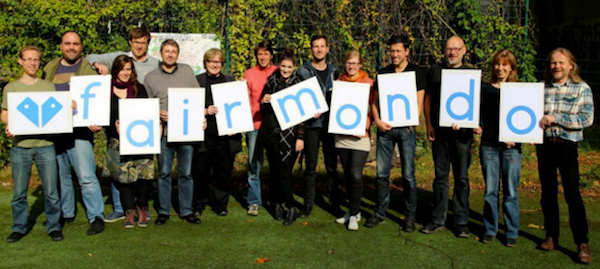
Another strength we have is our authentic commitment to open source and open innovation. We do have a whole list of innovative features in the pipeline, but we have to roll them out and test them one by one, given our budget constraints.
Do you have revenue projections for the next three years? If so, are you comfortable sharing them?
In 2016 we will focus on consolidating our business at the small scale it is now, further developing the software and preparing another round of crowdfunding in Fall. Thus we project moderate annual revenues around $150,000 Euros. In 2017 and 2018 we will focus on scaling and at least tripling this amount each year.
What's your ultimate goal with Fairmondo? How will you know when you've succeeded on the original vision?
We will not stop until the largest part of e-commerce is democratically owned by users and stakeholders along the supply chain. The new ownership structures need not necessarily be called "Fairmondo" or any other brand name by then.
It is possible, and, in my view, likely, that our model will change and adapt quite a bit along the way, possibly transforming into an even more commons-based, decentralized and localized setup than our current platform approach. But we still have quite a bit of work to do to get there.
Originally published under a CC BY 3.0 license
Go to the GEO front page

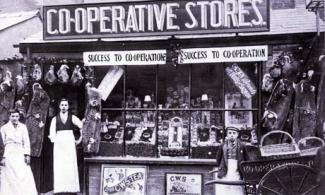
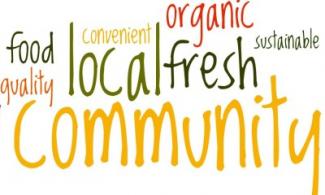
Add new comment